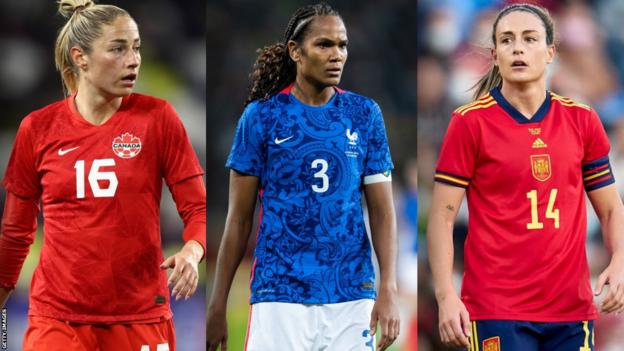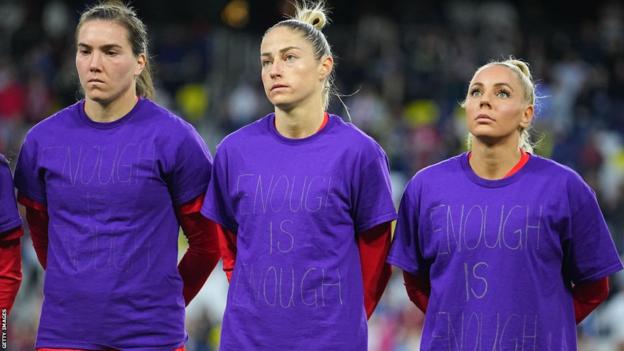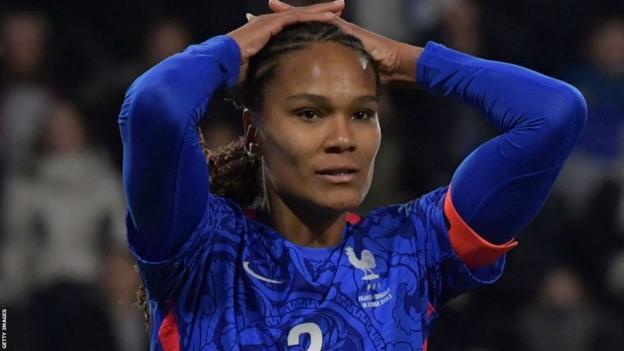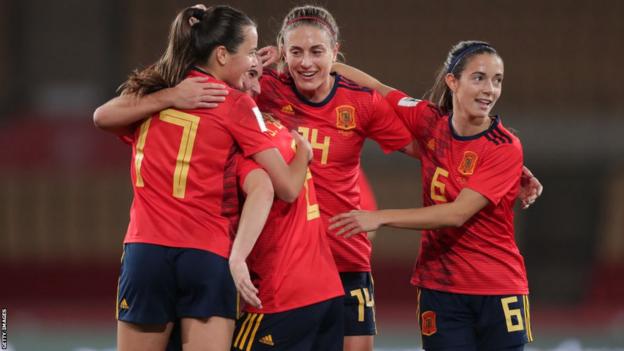
Four months before the World Cup kicks off in Australia and New Zealand, several leading nations are in disarray.
Canada, Spain and France have made headlines in recent months as disputes between players and federations have escalated.
Players have raised concerns about equal pay, a lack of professional resources and how they are being managed for their national teams.
BBC Sport has been speaking to Fern Whelan from the Professional Footballers’ Association (PFA) about what can be done to prevent these situations arising, as well as taking a closer look at how those teams ended up in this position.
Canada battling for equality

Canada’s national team are embroiled in a dispute with Canada Soccer (CSA) over equal pay.
Last month, players announced a strike over pay equity concerns and a lack of funding that they said would compromise their performances.
It was subsequently called off because of the governing body’s threats of legal action, but the players protested during the recent SheBelieves Cup by wearing purple T-shirts with the phrase “enough is enough” written on the front before their matches.
Players have now threatened to boycott a camp in April if demands are not met.
Last week, some players appeared before Canada’s parliament to discuss the ongoing dispute, with record goalscorer Christine Sinclair saying they had been “forced to negotiate in the dark”.
“The success of the national team is inspiring the entire country and the future should be brighter than ever,” she said.
“However, as the popularity, interest and growth of the women’s game has swept the globe, our most painstaking battle has been with our own federation.”
Former England international Whelan, who is now an executive for equality, diversity and inclusion in women’s football at the PFA, said it was “clear” federations are “not doing enough” and Canada’s players, speaking out as a collective, is a “powerful” indication of that.
“These are nations that have real, top-quality experience in major tournaments,” she said.
“The Canadian team have recently won the Olympics and these are teams that have excelled in their sport, and the players are not getting the support they feel they should be to be able to thrive and do their day-to-day jobs.”
It is understood senior players are leading negotiations on behalf of the squad, while players from the United States have shown support after going through a similar dispute in March 2019.
“It is important to have players showing support for each other and not just speaking as individuals. It’s really powerful to have a collective voice,” added Whelan.
France discord between manager and players

There has been underlying tension between some France players and manager Corinne Diacre for a number of years, which came to a head last month when several stars, including captain Wendie Renard, said they would no longer represent their country.
Renard criticised the France “system” and was joined in a boycott by team-mates Marie-Antoinette Katoto and Kadidiatou Diani, who said the “management” was behind her decision.
Diacre called it a “smear campaign”, but was unable to prevent the French Football Federation (FFF) from bringing to an end her turbulent six-year reign.
Announcing her sacking last week, the FFF said the situation was “irreversible”.
There has long been fractious relationships between Diacre and several senior players because of her aggressive management style.
In 2017, Diacre stripped Renard of the France captaincy. In 2019, she left Katoto out of the World Cup squad. In 2020, Amandine Henry – Diacre’s captain in 2019 – was dropped after the midfielder claimed it was “total chaos” in camp.
Support for Diacre appeared to be split among the squad, but there was a united frustration at the FFF’s alleged lack of support for women’s football, its management and player care.
“Something that was flagged by one of the French players is that they are concerned about their mental health and wellbeing,” said Whelan. “They were having to take themselves away from the squad.
“As a player, I had someone I could talk to if I was struggling with my mental health. It’s making sure there’s a support network in place.
“It’s not just going out and playing football – it was how I was looked after off the pitch too. The main thing is knowing the player is a person before a footballer.
“How do we, as federations, ensure we are looking after the player? That’s the main thing.”
Spain players take on coach and federation

Spain’s players are also involved in a dispute with their head coach, Jorge Vilda, but with a very different outcome – the Spanish Football Federation (RFEF) has thrown their full support behind the man in charge.
In September, RFEF claimed 15 members of its national team said they would resign if Vilda did not step down.
That was denied by the players – but a stand-off has ensued, with the 15 involved not being selected since. That includes Ballon d’Or winner Alexia Putellas and her Barcelona team-mates Aitana Bonmati and Irene Paredes, who was Spain captain.
It is understood players first raised concerns over training methods, inadequate game preparation and coaching decisions during Euro 2022, where the team reached the last eight before losing to eventual winners England.
No progress on the dispute is believed to have been made, with RFEF building a new squad with the same coaching staff for the World Cup.
Some of the Euro 2022 squad remain reluctant to return to the set-up, with others open to discussion in an bid to find a resolution before this summer’s tournament.
In October, Spanish journalist Maria Tikas, who writes for the country’s daily newspaper Sport, told BBC Sport she “felt envy” at what other federations – including England – were doing to support women’s football.
“I feel disappointed because this situation has come when Spanish women’s football was at its best, and it’s definitely a step backward,” she added.
What should the next steps be?
Former Brighton and Everton defender Whelan said it is “worrying” there is so much turmoil in international football, but the rapid development of the game has brought issues to the forefront.
“We’re at a critical period,” she added. “There’s high exposure, high interest and we want so much from the players. We need to make sure we give back to them and we listen to what they need.
“It’s a shame it’s got to this point but players should be commended for using their voices. People should be taking women’s football seriously, and they should have been doing that long before now.”
With so many players speaking out for change before this year’s World Cup, Whelan said “real action has to happen” now.
France’s decision to axe Diacre may have come later than some players would have liked, but it gives them chance to regroup and rebuild before the World Cup. Renard has already told French media she would be open to a return if the next coach wants her to.
“What’s hopefully happening now is players are getting listened to, and it’s not just a token gesture,” she said. “They should be able to thrive in the environment and not feel like it is resisting them and holding them back.
“I think moving forward we can do it with the players’ voices in mind. We can have a partnership. They are the ones who go to training every day.
“We wouldn’t have football without players so why wouldn’t we include them in developments? While the game is growing and it’s really positive, we need to look after the players at the heart of it.”





